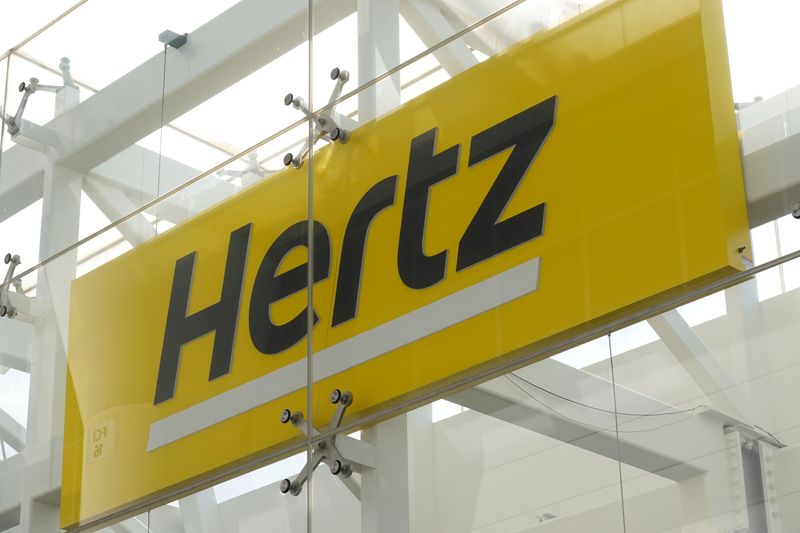By Akash Sriram and Nathan Gomes
(Reuters) – Electric vehicles were already considered expensive and hard to repair. Now their image could take another hit as rental giant Hertz dumps 20,000 of them, including Teslas, for gas-powered cars.
Hertz, the largest U.S. fleet operator of EVs, has blamed the sale on high repair costs and weak demand for the vehicles it offers on rent.
Analysts and industry experts believe the move will affect the second-hand market for EVs and dissuade buyers who are already rethinking big purchases due to higher borrowing costs.
“The larger impact of Hertz EV fire sale is the perception hit to the technology,” said Karl Brauer, analyst at used-car aggregator iSeeCars.com.
“Mainstream consumers are already hesitant to buy an EV, and this news only supports their concerns.”
The higher costs associated with repairing EVs stem from a lack of sufficient expertise in dealing with such vehicles and challenges in getting the replacement parts as they are still very new, industry experts said.
Hertz CEO Stephen Scherr flagged elevated costs caused by damages to certain EVs, particularly Teslas, last year at a conference.
Tesla and Polestar, whose cars are popular with car rental firms, did not respond to a request for comment. Car rental firm Avis and Enterprise also did not respond to a query on its EV strategy.
CEO Scherr said Hertz limited the torque and speed on the EVs and offered them to more experienced users to ensure easier rides after certain renters had front-end collisions.
Growing pains for startups and legacy automakers that are new to the technology also mean that EVs have been facing more problems than gas-powered cars, according to a survey last year by non-profit Consumer Reports.
The survey, covering owner responses on more than 330,000 vehicles, showed that EVs from the past three years had 79% more problems than conventional cars.
For many EVs, there is no way to repair or assess even slightly damaged battery packs after accidents, which forces insurance companies to write off the cars with a few miles – leading to higher premiums and undercutting gains from going electric.
German rental firm SIXT said on Tuesday it signed a multi-billion euro deal with Stellantis to buy up to a quarter of a million vehicles.
The deal will also see Stellantis provide some EVs to the German mobility service provider, but the companies did not offer further details.
Hertz’ move underscores a wider shift in the EV landscape.
After pledging billions of dollars for their EV ambitions in recent years, legacy automakers have pulled back their production plans as demand slows.
EV sales growth in North America is expected to slow to about 27% this year from a scorching 72% in 2023, according to market research firm Canalys.
CUT-PRICE SALE
Hertz may have to dispose of the EVs at hefty discounts due to the higher miles they have covered as well visible damage such as nicks, scratches and dents, according to experts.
“Having rented several Model 3s from Hertz over the past six months, my observation is some of them are cosmetically pretty rough,” said Scott Case, CEO of EV research firm Recurrent Auto.
Nearly all of the more than 500 used EVs the company has on sale are Teslas, with some Model 3 compact sedans being listed for as little as $21,000 – half the price of a new car and up to $10,000 lower than cars of similar mileage at other sellers.
Such a cut-price sale would likely reverberate across the second-hand market of EVs, which already command a lower price than conventional cars.
The value of used EVs has dropped 33.7% between October 2022 and October 2023, even as the overall used car market dropped only 5.1%, according to data from iSeeCars.
Hertz could, however, benefit from the $4,000 tax credit for some used EVs under the Inflation Reduction Act, which brings down the price of some vehicles it is trying to sell well below many gas-powered cars.
Some experts also said the high repair costs of EVs are a short-term challenge that comes with any technology and will ease as more of those vehicles hit the road.
“The infrastructure has to catch up with the transition, and that will bring the prices down,” said Lynne McChristian, director of the Office of Risk Management and Insurance Research at the University of Illinois.
(Reporting by Akash Sriram, Nathan Gomes in Bengaluru; Writing by Aditya Soni)
